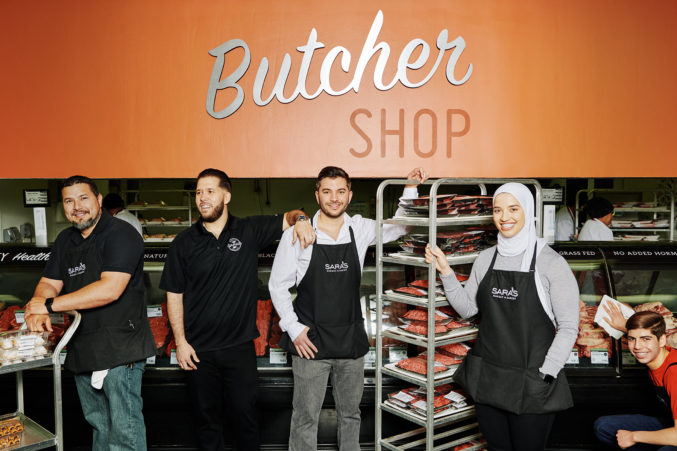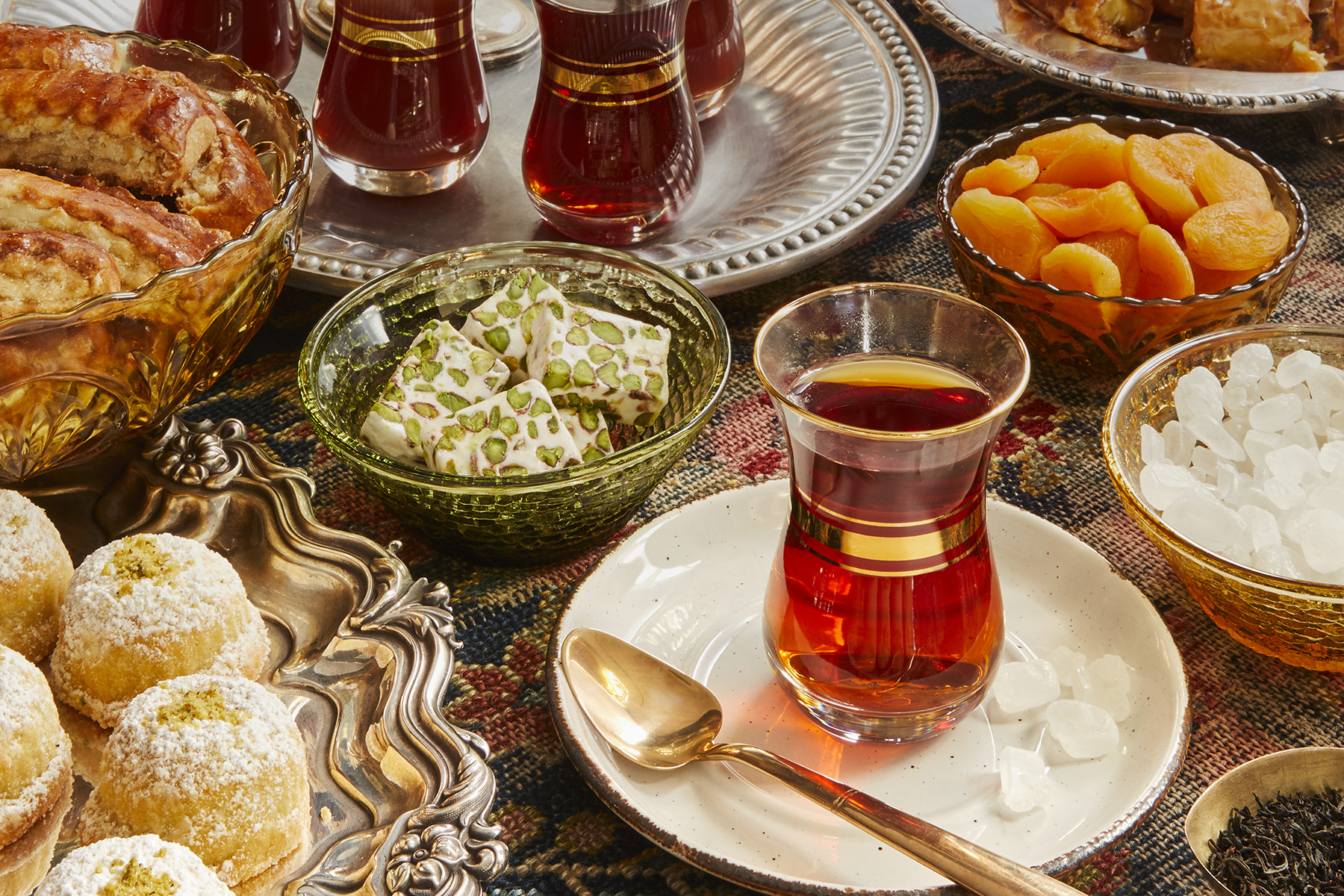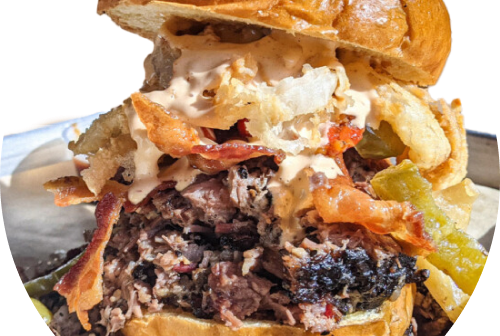This year, the holy month of Ramadan, traditionally a time of fasting from dawn until dusk, is unfolding like no other year.
For the 1.8 billion Muslims around the world, this year’s Ramadan—which falls April 23 to May 23—is a time when the Grand Mosque in Mecca, the holiest shrine, is closed to the public. Local mosques in the Dallas area are shuttered, too. And sanitation workers disinfect the sacred surface of the Grand Mosque’s Kaaba, toward which all Muslims pray.
Usually, for those who observe, it is a time when iftar, the evening meal, is an occasion for families to gather over feasts and socializing that stretch into the night. The breaking of the fast is celebrated with elaborate spreads—platters of sizzling meats and fragrant, spice-laden rice. Instead, as the world faces coronavirus realities, a holiday meal anchored in sharing is bereft of its usual communal nature, full of joy and exuberance.
Normally, Dallasites may be planning trips to be with family or stocking up on packages of date paste. But like so much of life these days, we live virtually and differently.
I’ve been watching as photojournalists capture images of empty mosques from Cairo to Kuala Lampur to Jakarta and Pakistan. I’ve been following Anissa Helou, the Syrian-born, London-based, James Beard award-winning cookbook author, as she posts on Instagram what she calls her Ramadan photo of the day. The images are simple, gorgeous still-lifes from past travels of a vendor flattening naan in Lahore, Pakistan; a paratha seller in Srinagar, India; a tearoom in Kashmir with stacked sweets set against an arresting peacock-blue settee; or a predawn breakfast of labneh, cucumber, and za’atar-dusted flatbread. This year has a very different cast. These feel like postcards from another time.
Here, Zaid and Duaa Bayan, whose family owns the independent Middle Eastern grocery Sara’s Market and Bakery in Richardson, are witness to the shifts in purchasing patterns and supply chains that I’ve been sensitive to as I observe the landscape of Ramadan in Dallas.
Anchored in the community as he is, Zaid, who, as the end of a supply chain has intimate ties to the community, has noticed fears. The fear that fasting might weaken the immune system; the fear of not having access to prayers, like the important evening prayer in the mosque that usually follows the breaking of the fast; and lamenting over not being able to gather for communal meals.
“Ramadan usually brings families together. But now because of the social distancing, it’s been quite a challenge,” he says. “And especially because [people are] praying at home and [can’t] share iftar with each other. A lot of people were scared at first and worried. But we’re halfway through it. People are still cooking. And thankful to be healthy.”

It has been, as it always is, a time of baking. (And more so, as we seek normalcy.) People are making date breads and date cookies and ma’amouls, which get the imprint of a decorative wooden mold. Rosewater and orange blossom water go into rice puddings and semolina and date paste are stars of a whole pantheon of Ramadan sweets. There are pastries filled with clotted cream; yeasted breads; desserts soaked in sugar syrup, cut into diamonds, studded with slivered almonds, dusted with powdered sugar, or topped with gold leaf.
Confections include flaky, sticky layers of filo dough or diamonds of fine, shredded-wheat-like angel hair that bears tufts of bright green powdered pistachio. Even Zaid’s wife, who was raised Catholic and had never made the delicate qatayif dough, was making it from scratch.
“We can’t keep up with yeast, flour, sugar,” Zaid says.
At Sara’s, the Bayans experienced an initial lag on supplies of flour, sugar, and eggs, as purveyors hit hard by demand were limiting product. They had to place limits on customers’ purchases of date paste, syrups, and semolina, as distributors who might normally deliver 50 cases cut deliveries to two.
The first weekend before Ramadan is usually packed, but Duaa says the ebb and flow of purchasing patterns has been more unpredictable.
Still, Duaa says the purchasing trends aren’t ultimately varying that greatly, though portions (and quantities of the favored meats, like lamb) are smaller as nightly sumptuous repasts have shrunk to smaller family gatherings—or virtual iftars on Zoom.
They’ve still depleted their stocks of the popular Vimto syrup, the sweet, fruity purple syrup—a mix of grape, raspberry, and black currant—that gives energy for those breaking a fast. Customers are purchasing lamb for time-consuming and extravagant dishes like the impressive dish that marries dehydrated goat whey with rice in a feast that involves accompaniments of vegetables and grape leaves. “It’s like a splurge. It’s something that you reward yourself with,” she says. “The trends are the same. It’s just that people are not doing their invites and gatherings.”
Duaa worries that catering business for those small operations that work word of mouth and cater from home might be experiencing a lag this Ramadan. “[Usually], Ramadan is a time for that. These avenues are not being used right now.” And Zaid speaks to the need to reach the hungry, at a time when mosques are usually filling that niche. Sara’s recently donated 300 meals to those in need, and others are stepping in to fill the gap.
Restaurants, too, are having to adapt. Usually, Ramadan buffets are a brisk market. Now, some restaurants are offering curbside pickup or delivery of individual or family iftar packages, ordered in advance. A friend of mine recently picked up a meal of spice-rubbed chicken over fragrant rice. There, tucked in with to-go ware was a date—the traditional opening of any iftar meal. Now, a sacred, ritual meal is converted to a curbside pickup mission.
In a time of closed mosques, when even a sacred, ritual meal is converted to curbside pickup, Duaa is impressed by the adaptation. Like the nightly prayers. “They’re not offered any other time [of year]. You pray them after your last prayer, and you typically go to the mosque, and it’s the sense of community. A lot of the imams are offering lectures and series online, so you can use their daily videos to try to feel that spirit … to help mental health … and that sense of community.”
And as people turn to virtual iftars and live prayer broadcasts, Zaid is feeling a connection more globally and generally like perhaps never before. “Ramadan is bringing us closer together,” says Zaid. It’s a solemn period of introspection and interiority. “COVID-19 has almost given us that same detox—of the world, of our environment, of pollution,” he says. “You’re supposed to be less distracted during the month of Ramadan. I almost see it as doing the same thing.”
There is a silver lining for Ramadan observants.
“This is the first time we’re all going through the same struggle,” Zaid added. “We’re exposed to the same threat. We’re one. We’re really in this together.”






